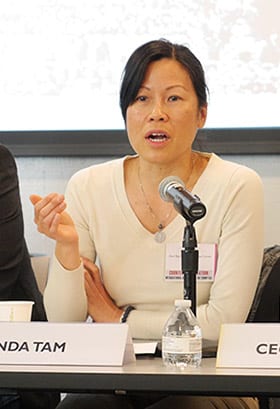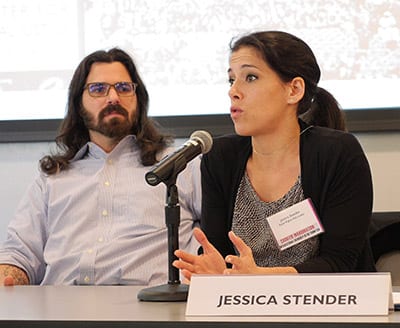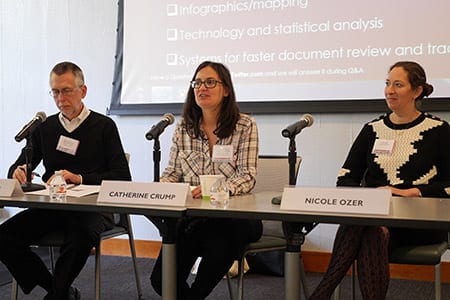
During a daylong symposium at Berkeley Law on January 27, lawyers, policy experts and scholars identified legal implications of the new presidential administration and strategies for addressing them.
Presented by the school’s Thelton E. Henderson Center for Social Justice, the event tackled issues of gender, sexual and reproductive justice; immigration; domestic surveillance; the environmental, social and governance impacts of business; race relations; and incarceration.
Center Executive Director Savala Trepczynski ’11 said Donald Trump’s campaign and initial actions as President “threaten social justice and democratic norms. The conversations at this symposium let us explore the legal and human impacts of his agenda.”
Trepczynski moderated the race panel, which she said sought to “tease out why Trump’s racialized campaign rhetoric was so effective. We wanted to give people an opportunity to sort through that question in an open, honest and low-pressure space.”
Immigration anxiety
Moderated by Professor Leti Volpp, the immigration panel described an uncertain landscape amid executive orders banning all refugees for 120 days, people from seven predominantly Muslim countries for 90 days and Syrian refugees indefinitely. Panelists also noted that before Trump became President, a record three million people were deported under Barack Obama.
Citing the recent wars in Iraq and her native Afghanistan, American Civil Liberties Union (ACLU) consultant Nasrina Bargzie ’05 asserted that the new ban on refugees “ignores our country’s role in creating these refugees. She said, “National security is not an area of law, it’s a convenient excuse.”
Linda Tam ’00, director of the East Bay Community Law Center’s Immigration Program, shared experiences from a chaotic week. “I’m getting questions I’ve never heard before,” she said. “Clients are asking, ‘How long will it take to change the laws? Is my U-Visa processing just going to stop?’ Even clients with green cards are scared. A climate of fear has been created among all immigrant communities.”
One of Tam’s clients was deported that same day. After explaining to Immigrations and Customs Enforcement (ICE) officials that a stay of removal filed on his behalf had not been reviewed, Tam said she was told, “‘This isn’t a negotiation.’” In her view, “ICE now feels emboldened. Enforcement and the scope of who can be deported is already expanding, and local law enforcement has carte blanche to act as immigration officials.”
Panelists also discussed the potential impact of the federal government defunding sanctuary cities and using voter fraud investigations to suppress minority voting.
Women’s rights
Jill Adams ’06, executive director of Berkeley Law’s Center on Reproductive Rights and Justice, moderated a panel on the rights of women and the LGBTQ community. Equal Rights Advocates senior staff attorney Jessica Stender ’09 predicted a rocky road for wage and workplace equality.

“We’re already seeing an attack in those areas, and can expect rollbacks on legal protections there,” she said. “California has a lot of strong laws on the books. … Keeping our rights strong and protecting them as a model for other states across the country is extremely important.”
California has the nation’s strongest gender equity fair pay act, Stender said, and legislators are developing two bills to expand unpaid medical leave following childbirth. One bill would increase the types of workers eligible for such medical leave; the other would lower the threshold of company employees entitled to it—from 50 or more, to 20 or more.
On the federal level, Stender expects “little to no movement” on creating more family-friendly workplaces “even though 82 percent of women now get pregnant while working.” Citing the Equal Employment Opportunity Commission (EEOC) as a barometer for women’s workplace rights, she said, “The guidance the EEOC receives from above will dictate how much it enforces. It has been focused on robust systemic change in recent years, but now will probably swing to select individual cases.”
Stender also discussed efforts to weaken Title IX, which bans discrimination on the basis of sex in any federally funded education program. She cited a push to increase the burden of proof in sexual assault cases on college campuses, which she said could continue under Trump.
Domestic surveillance
Experts on the surveillance panel predicted that privacy will become increasingly elusive. James Dempsey, executive director of the Berkeley Center for Law & Technology, said public and private sector experts agree that “this is the golden age of surveillance.”

Nicole Ozer ’03, Technology and Civil Liberties Policy Director for the ACLU of Northern California, noted that federal law safeguarding electronic communications has not been updated since 1986. One of the results is “a massive surveillance infrastructure that may now be used to disproportionately target immigrants, activists and journalists,” she said.
Ozer also discussed the dramatic spike in local law enforcement’s sophisticated surveillance equipment over the past few years. “Much of it has been purchased without any local oversight because it came in with federal grant money,” she said. “We have to reveal what’s happening, because much of it is in the shadows.”
Ozer cited effective examples of publicizing such instances. When journalists revealed Oakland’s push to build a fusion center that would funnel data to the federal government’s data bank, the public outcry was so great that the center was never built. Soon after, the Oakland Privacy Commission—the nation’s first such local entity—was created. Similar efforts grounded a drone purchased by San Jose through federal funding, and stopped a social media surveillance operation by the Fresno Police Department that tracked hash tags such as #BlackLivesMatter and #TimeForChange.
Catherine Crump, acting director of the Samuelson Law, Technology & Public Policy Clinic, described myriad opportunities for Berkeley Law students to work on timely surveillance issues—and the importance of those efforts. “When California does something, the rest of the country thinks, ‘Maybe that can work here, too,” she said.